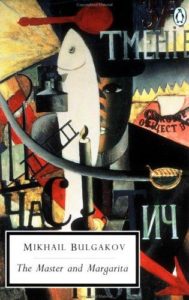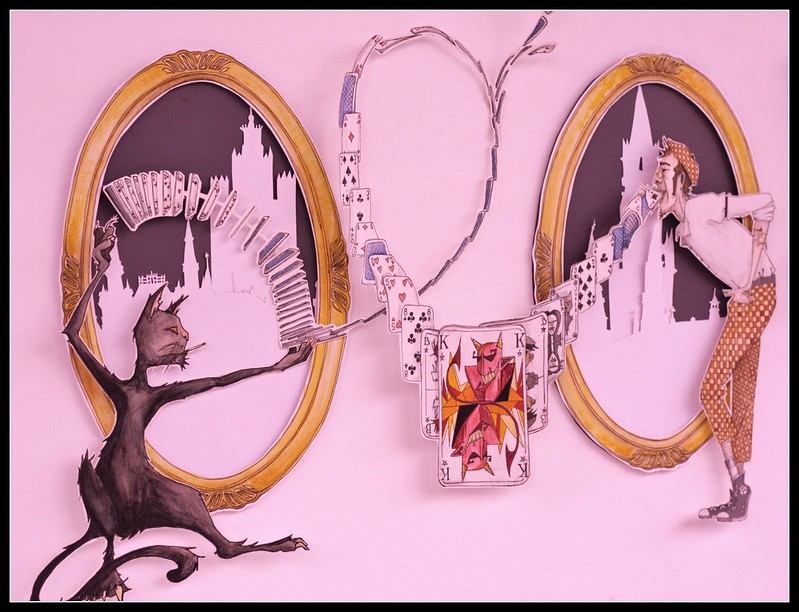Call this the most overdue book report in recorded history. “The Master and Margarita” (Penguin Classics, $19) sounds like something spawned from the imaginations of Hispanic writers like Gabriel Garcia Marquez or Jorge Luis Borges. It certainly fits into the realm of “magical realism” that those two novelists inhabited. Despite this, the book is as Russian as it gets.
Written in Stalin’s Soviet Union during the 1930s, the book was, for very obvious reasons, not published then. The author, Mikhail Bulgakov, was already in enough trouble with the tyrannical regime and spent time in gulags for various “crimes against the state.” If this book had been published, the gulag would have been the least of his worries.
Imagine the cultural arc this writer’s life had traveled. He was born into a Russian empire, as close to a feudal state this side of the 20th century one was going to find. It was led by an elite aristocracy capped by a God-approved monarch in a medieval system of rights and jurisprudence. He then saw that system collapse in a nanosecond by the tumult of the Russian Revolution and replaced by an upside-down model of Godlessness ruled by a different mode of tyranny.
In the midst of this civilizational rubble, Bulgakov builds his own absurdist world filled with ridiculously impossible characters but armed with universal truths. The book is the counterweight of the absurdist Marxist paradise he was living in, which was built on universal falsehoods.
The roller coaster of a plot begins with the head of a state-approved literary guild meeting with a state-approved author on a park bench in the center of Moscow one sweltering summer afternoon. The meeting was called by the head of the literary guild to discuss the status of the writer’s approved book aimed at proving Jesus never existed. The draft has come up wanting and the writer admits his shortcomings, mainly because he is struggling with the irrefutable evidence of the existence of Pontius Pilate.
The meeting is interrupted abruptly when a strange “foreigner” sits between the two men on that park bench and volunteers that he knows all about the trial Pontius Pilate adjudicated. The two literary types press him on how he is so sure, whereupon the foreigner calmly answers, because “I was there.”

The foreigner is immediately dismissed in their eyes as either insane, or worse, a foreign spy. He takes no offense, but before he takes his leave, he gives the head of the literary guild a strange warning and bids adieu.
It is when the strange warning comes true — resulting in the grisly death of the head of the literary guild — that the reader becomes aware the stranger is Satan, even if most of the characters, living in a state where God does not exist, have an almost impossible task of recognizing evil when it stands before them with a goatee and pince-nez glasses. And things are just beginning.
The mischief that ensues is equal parts broad comedy and diabolical nihilism. “The Master and Margarita” is a story that could only be written with the aforementioned upheaval where God was banished, and the state formed in the image mapped out by a relatively small band of elites.
It is this cabal of elites the book takes aim at, in wildly comic, tragic, and supernatural ways. The author embraces absurdity like the folly of man-made mechanisms, such as the literary guild that outwardly seeks the “truth” about Jesus just as long as the truth coordinates with the party line.
Like all great Russian literature, the book is longer than it has to be, but it takes time and a hefty page count to ruminate on the nature of evil when Satan moonlights as a professional magician, scantily clad witches fly around the domes of St. Basil’s Cathedral, and when one of his possessed accomplices is a 5-foot-tall talking black cat who walks on two feet and has a penchant for vodka. If all that is not enough, the book includes star-crossed and doomed lovers and a satanic ball of lost souls.
Bulgakov was not a closet Christian. His book makes it clear he was a resolute skeptic, though the segments of his book that flash back to Pontius Pilate and his crisis of dealing with this strange Nazarene prisoner hint that Bulgakov may have had some doubts about his doubts.
“The Master and Margarita” reminds me of my favorite humanist American author Kurt Vonnegut. He, too, turned the volume of the absurdity dial to 11, and by doing so searched for the truth. Neither author used the light of Christ to guide them, but there is certainly something of value in literature of this caliber that we out-of-the-closet Christians can and should be able to appreciate.

